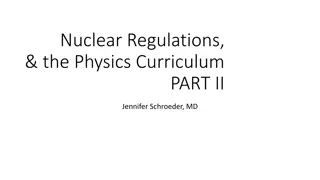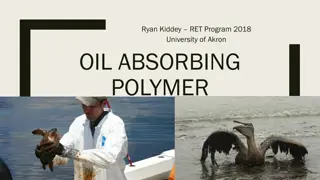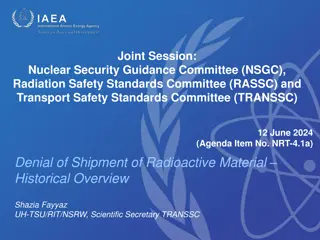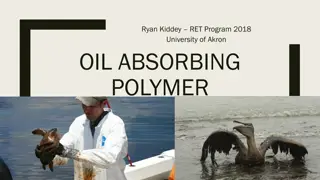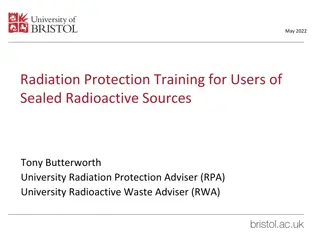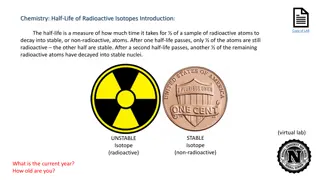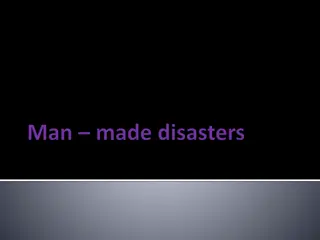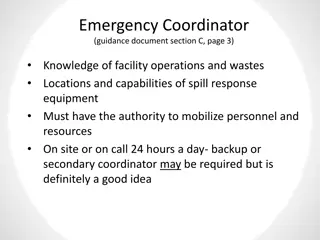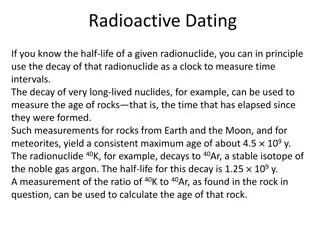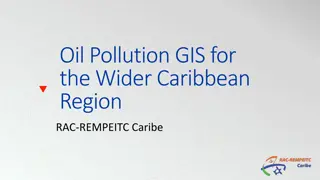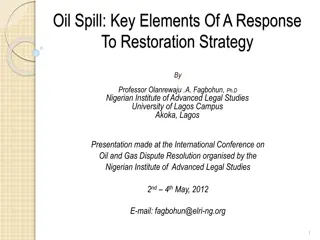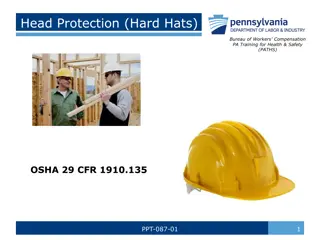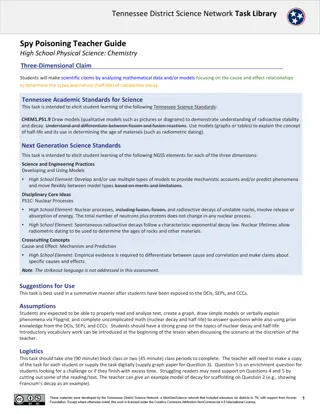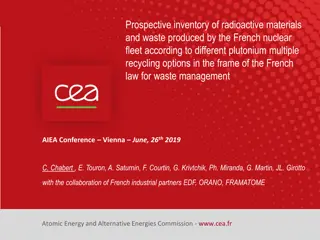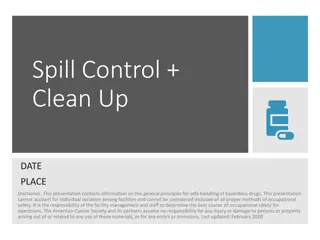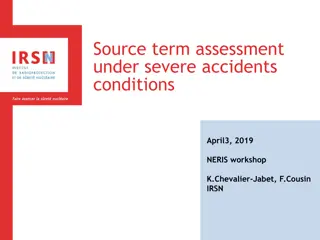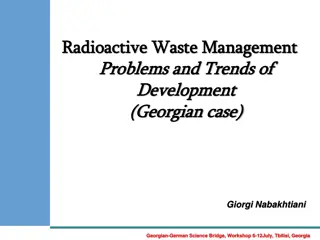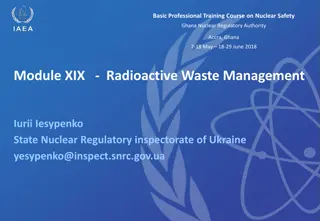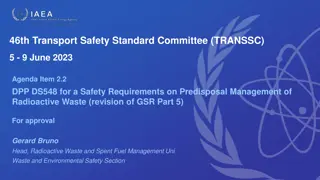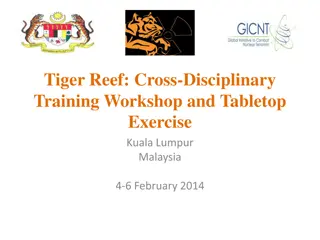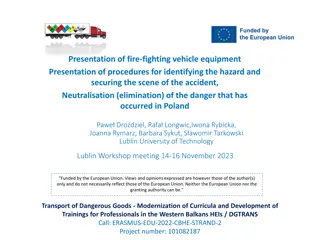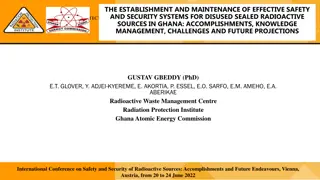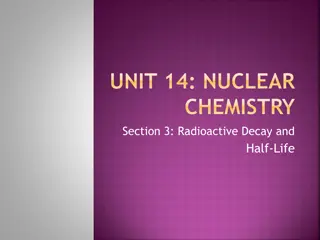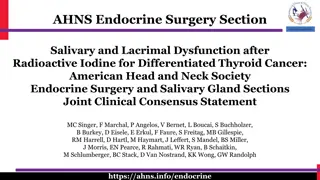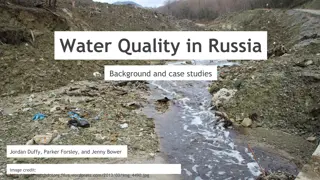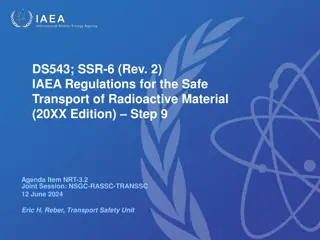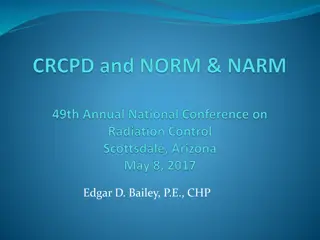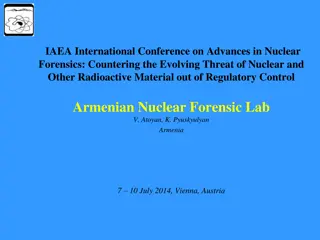Buy Kitchen Plastic Cooking Manual Hand Oil Pump (Multicolor,Pack Of 1)
Effortless Cooking Elegance: Manual Hand Oil Pump\nSimplify Your Culinary Adventures with the Kitchen Plastic Cooking Oil Pump\nIntroducing the Manual Hand Oil Pump, a versatile and efficient kitchen companion that adds a touch of elegance to your cooking routine. Crafted from durable plastic, this
0 views • 3 slides
Understanding Polarity and Oil Spill Impacts
Explore the concept of polarity in molecules and its impact on interactions, learn about the environmental effects of oil spills, and understand methods used for oil spill cleanup. Discover how polar and nonpolar molecules behave differently and the challenges posed by oil spills on wildlife and eco
2 views • 13 slides
Best Practices for Handling Radioactive Spills in Nuclear Medicine Facilities
Understanding the guidelines for dealing with radioactive spills is crucial in nuclear medicine. This comprehensive guide covers major and minor spill scenarios, steps to take in case of a spill, and special considerations for radioactive gas spills. Learn how to ensure safety, prevent contamination
1 views • 34 slides
Understanding Radioactive Decay and Nuclear Radiation
Radioactive decay is the process in which unstable atomic nuclei emit charged particles and energy, transforming into different elements. This process involves the emission of alpha particles, beta particles, and gamma rays. Alpha particles consist of two protons and two neutrons, beta particles are
4 views • 31 slides
Understanding Half-Life in Physics
Half-life is a key concept in physics, particularly in radioactive decay. It is the time taken for the activity of a radioactive source to decrease to half of its original value. This can be determined experimentally through measuring counts per minute and graphing the data. Additionally, half-life
2 views • 11 slides
Understanding Oil and Water Interaction in Environmental Science
Explore the complex relationship between oil and water, including the challenges of containing oil spills and the use of innovative oil-absorbing polymers. Learn why oil and water don't mix due to their differing polarities and discover how polymer technology like Enviro-Bond 403 plays a crucial rol
4 views • 7 slides
National Radioactive Waste Management Plan Overview
Briefing the Select Committee on Land Reform, Environment, Mineral Resources, and Energy about the South African Radioactive Waste Management Programme and the legislative background governing radioactive waste management. The presentation outlines the framework, guiding elements, waste management p
4 views • 19 slides
Evolution of Radiopharmacy: A Specialized Field in Pharmacy
The evolution of radiopharmacy as a specialty has progressed rapidly since the 1950s, involving the preparation, dispensing, and clinical investigation of radioactive materials as drugs. Radiopharmacy plays a crucial role in the development and use of radiopharmaceuticals for diagnostic, therapeutic
3 views • 53 slides
Plastic Bag Manufacturers in Ahmedabad
PE bags and liners offer an indispensable solution for various needs, combining durability and versatility. Whether safeguarding goods during transportation or organizing household items, PE bags excel in their ability to resist tears, punctures, and moisture. Their flexibility makes them ideal for
1 views • 3 slides
Best service for Hard Floor Cleaning in Croxley
Capital Carpet Cleaners offers the Best service for Hard Floor Cleaning in Croxley. Their comprehensive services include carpet cleaning, upholstery cleaning, commercial cleaning, mattress cleaning, hard floor cleaning, and wood floor restoration. No stain is too tough for them to handle. From food
1 views • 6 slides
Overview of Denial of Shipment of Radioactive Material in NSGC, RASSC, & TRANSSC Joint Session
The Joint Session held by the NSGC, RASSC, and TRANSSC on June 12, 2024, discussed the historical overview and implications of denying shipments of radioactive material. It highlighted the importance of coordination with UN organizations and industry groups in ensuring the safe transport of such mat
1 views • 7 slides
Fascinating Facts About Iguanas: From Skills to Survival
Iguanas, part of the Iguanidae family, are unique reptiles with special skills like tree climbing and predator evasion. They face threats due to human consumption and environmental hazards, such as oil spills for marine iguanas. Their sensory organ, Jacobson's organ, helps them navigate their surrou
0 views • 10 slides
Understanding Oil-Water Interaction and Oil Absorbing Polymers
Explore the intricacies of why oil and water don't mix, the challenges faced in containing oil spills, and the innovative solution of oil-absorbing polymers like Enviro-Bond 403. Discover the science behind non-polar substances, hydrophobicity, and the role of polymers in environmental protection.
2 views • 7 slides
Radiation Protection Training for Users of Sealed Radioactive Sources - May 2022
This document provides radiation protection training tailored for users of sealed radioactive sources, ensuring compliance with legislative requirements and university policies. The training covers topics such as ionising radiation, effects of exposure, monitoring requirements, and more. All trainin
0 views • 81 slides
Exploring Radioactive Decay: A Half-Life Lab Simulation
Explore the concept of radioactive decay through a virtual lab simulation involving strontium-90 (Sr-90) and yttrium-90 (Y-90) isotopes. Witness the decay process over multiple half-lives as unstable atoms transform into stable nuclei. Dive into the intricacies of half-life measurements and the vast
0 views • 10 slides
Man-made Disasters: Short-term Events and Long-term Consequences
Man-made disasters come in two main forms: short-term events like oil spills or nuclear accidents, and long-term consequences such as climate change and loss of biodiversity. This article covers incidents like the Westgate Bridge Catastrophe in Melbourne and the Tasman Bridge Collapse in Hobart, hig
0 views • 24 slides
Essential Emergency Coordinator Guidelines for Facilities
This guidance document outlines the key responsibilities and requirements for an emergency coordinator at a facility. It covers the knowledge needed for facility operations, spill response equipment, authority to mobilize resources, and protocols for handling fire, spills, and other incidents. Addit
0 views • 7 slides
Understanding Radioactive Dating Methods
The process of radioactive dating involves utilizing the decay of radionuclides to measure time intervals, with applications in determining the age of rocks and artifacts. Techniques such as radiocarbon dating, based on isotopes like 14C, enable scientists to determine the age of organic materials b
0 views • 4 slides
Essential Safety Guidelines for Home and Kitchen
Essential safety guidelines for preventing accidents and handling first aid situations at home and in the kitchen. Tips include precautions for using knives, handling spills, preventing burns, lifting heavy items, and dealing with chemical substances. Clear instructions on first aid procedures and h
0 views • 16 slides
Oil Pollution GIS for the Wider Caribbean Region by RAC-REMPEITC
Utilizing GIS technology, RAC-REMPEITC focuses on preparedness and response to oil pollution in the Caribbean region. The initiative involves early warning systems, detection, decision-making, coordination, equipment location, remote sensing, modeling, and international support to protect the marine
0 views • 15 slides
Understanding the Impact of Oil Spills: Key Responses and Lessons
Presented at an international conference, Professor Olanrewaju Fagbohun highlights key elements of responding to oil spills, emphasizing the significance of these environmental disasters. The vision for a healthy environment, the complexities of oil spill fate, and lessons learned from Nigeria's oil
0 views • 26 slides
Importance of Head Protection in Workplace Safety Training
Head protection, particularly hard hats, is crucial in preventing life-threatening head injuries in the workplace caused by falling or flying objects, bumps, and other hazards. This training covers identifying head hazards, types of hard hats, limitations, proper use, and care. Hard hats offer a rig
0 views • 21 slides
Kitchen Safety and Sanitation: A Guide to Preventing Accidents
Enhance your kitchen safety and sanitation practices by identifying unsafe aspects in the kitchen, preventing accidents like spills, cuts, and burns, and implementing general safety measures. Learn the importance of immediate clean-up, prior knowledge of equipment, and careful planning to maintain a
0 views • 21 slides
Investigating Agent Z's Poisoning: A Case of Radioactive Decay
Agent Z, a double spy, was poisoned with Polonium-210, a heavy, radioactive element. This task challenges students to analyze the cause of his death using concepts of nuclear decay and half-life modeling based on provided data and models. The scenario involves understanding the effects of radioactiv
0 views • 14 slides
Prospective Inventory of Radioactive Materials and Waste Management Study in French Nuclear Fleet
The study conducted by the French Atomic Energy Commission in collaboration with industrial partners like EDF, Orano, and Framatome explores different plutonium recycling options in the French nuclear fleet. It assesses scenarios involving open cycle, mono-recycling, and multiple recycling of pluton
0 views • 16 slides
Hazardous Drugs Spill Control and Clean-Up Guidelines
Learn about safe handling of hazardous drugs through spill control and clean-up procedures. This presentation covers identifying spills, using spill kits, cleaning spills, reporting, and documentation. Proper training and procedures are essential to protect personnel from exposure risks. Always foll
0 views • 27 slides
Understanding Source Term Assessment in Severe Nuclear Accidents
Delve into the complexities of source term assessment under severe accidents conditions, focusing on core degradation, containment pressure buildup, radioactive species release, safety systems, iodine-related phenomenology, and assessing the radioactive source term's impact on the environment. This
0 views • 21 slides
Challenges in Radioactive Waste Management: A Case Study of Georgian-German Science Collaboration
This document delves into the management of radioactive waste, highlighting the problems, trends, and development in the Georgian context. It explores the principles set by the IAEA for waste management, emphasizing the protection of human health, environment, and future generations. The discussion
0 views • 21 slides
Understanding Radioactive Decay and Isotopes in Chemistry
Explore the fascinating world of radioactive decay, isotopes, and nuclear transformations in this educational resource. From reviewing atomic numbers to illustrating alpha and beta decay processes, discover the fundamental principles behind these phenomena with detailed explanations and visuals. Del
0 views • 17 slides
Comprehensive Module on Radioactive Waste Management in Nuclear Safety Training
This module XIX on Radioactive Waste Management explores the generation, classification, treatment, storage, and disposal processes of radioactive waste. It covers the nature and sources of radioactive waste in medical, industrial, and research settings. The module also delves into the regulatory co
0 views • 106 slides
Revision of Safety Requirements for Predisposal Management of Radioactive Waste at 46th TRANSSC
The 46th Transport Safety Standard Committee addresses the revision of GSR Part 5 concerning the predisposal management of radioactive waste. This update aims to harmonize safety requirements with current standards and establish protocols for the safe handling of all types of radioactive waste. The
0 views • 17 slides
Cross-Disciplinary Training Workshop on Radioactive Materials Incident Response
Emphasizing the importance of communication and cooperation between different communities, the Tiger Reef workshop in Kuala Lumpur focused on enhancing capabilities to manage incidents involving radioactive materials. With participants from 21 countries, the workshop aimed to bridge gaps in SOPs, co
0 views • 15 slides
Proper Procedures for Dealing with Hazardous Substance Spills
This presentation covers the procedures for identifying and securing hazards at the scene of an accident, as well as neutralizing dangers in Poland. It includes information on fire-fighting vehicle equipment, such as different nozzles and tools used by the fire brigade. Steps for dealing with hazard
0 views • 7 slides
Effective Safety and Security Systems for Disused Sealed Radioactive Sources in Ghana
Ghana has benefited from the peaceful use of sealed radioactive sources in various sectors. The establishment of safety measures, security systems, and knowledge management for disused sealed radioactive sources (DSRS) is crucial. Challenges and future projections in this area are discussed, emphasi
0 views • 15 slides
Understanding Radioactive Decay and Half-Life in Nuclear Chemistry
Exploring the concept of radioactive decay and half-life in nuclear chemistry, this content covers the types of nuclear radiation, alpha decay of Uranium, and the significance of half-life in determining the decay of radioactive substances such as Carbon-14. An example with Fluorine-18 illustrates t
0 views • 9 slides
Salivary and Lacrimal Dysfunction after Radioactive Iodine Treatment
Radioactive iodine (RAI) is commonly used in treating differentiated thyroid cancer but can lead to salivary and lacrimal dysfunction. This joint clinical consensus statement by the American Head and Neck Society Endocrine Surgery and Salivary Gland Sections highlights the importance of understandin
0 views • 20 slides
Water Quality in Russia: Challenges and Case Studies
The water quality issues in Russia are multifaceted, with industrial and military pollution, radioactive contamination, and oil spills posing significant environmental threats. Policy conflicts, aged infrastructure, and historical legacies contribute to the complexities of addressing water quality i
0 views • 19 slides
International Regulatory Framework for Radioactive Material Transport Safety
SSR-6 (Rev.1) establishes safety requirements for transporting radioactive material to protect people and the environment from ionizing radiation. The framework applies globally across land, water, and air transport modes, involving operations and conditions related to radioactive material movement.
0 views • 24 slides
Regulatory Evolution of Radioactive Materials Licensing
The regulatory landscape surrounding Naturally Occurring and Accelerator-Produced Radioactive Materials (NARM) underwent significant changes in the 20th century. Various entities, including AEC/NRC and states, grappled with the regulation of NARM, leading to a lack of consistency. Initiatives such a
0 views • 17 slides
Challenges and Solutions in Protecting Radioactive Sources in Post-USSR Armenia
The collapse of the USSR presented Armenia with challenges in managing radioactive materials due to limited resources and unclear responsibilities. Incidents of illicit trafficking of radioactive sources have been reported, highlighting the need for robust regulatory controls and forensic capabiliti
0 views • 20 slides


